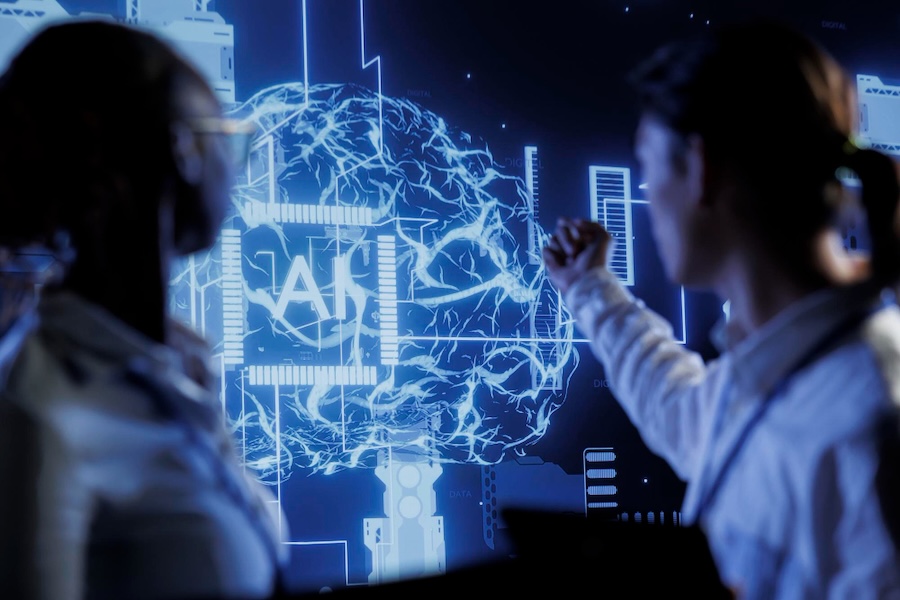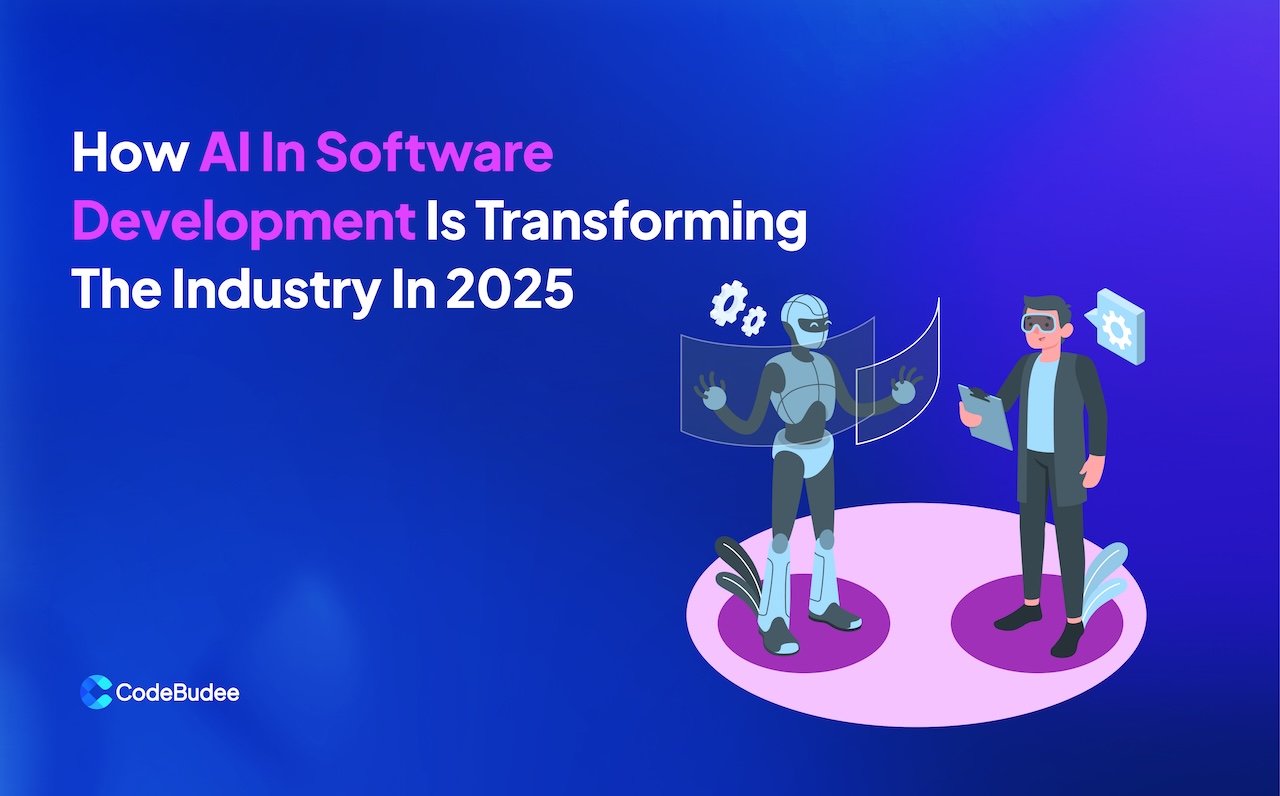It’s 2025, and today, it’s hardly possible to speak of the evolution of custom software development without AI and machine learning leading the change. Now, AI in software development isn’t just assisting developers; it’s automating tasks to fulfill user needs. From code generation to improving security, artificial intelligence is powerful enough to handle it all.
In this blog, we’ll dig into how AI and machine learning are transforming custom software development and why such advancements are crucial for businesses to move forward successfully. Let’s begin!
How AI in Software Development is Transforming the Industry

In 2023, the market for AI hit 200 billion USD, and the figures are only going up with machines learning to mimic human competencies. With AI becoming a hot trend, it’s no surprise that businesses want to learn how to integrate its power within their software.
To put it into perspective, here’s how AI is transforming the software industry and what it means for businesses today:
1. Enhancing Security In Custom Software
As more ventures transition to virtual platforms, cybersecurity and data breaches have become their top safety concerns. Multiple AI-powered cybersecurity tools and AI algorithms, however, help prevent attacks before they happen. These security solutions analyze data patterns, spot unusual activities, and identify threats in real time.
Similarly, machine learning detects fraud by scanning everyday transactions for anything suspicious, which makes it easy to spot scams early on. Better yet, AI solutions adapt to keep software updated. Their security measures, such as automated threat detection, behavioral analysis, and biometric scans, help developers respond to threats sooner than ever.
Naturally, companies that employ AI during custom software development tend to protect their systems better, keeping cyber risks miles away.
2. Helping With Maintenance & Bugs Fixing
Pretty much like machines, software solutions require updates and fixes to stay efficient. When considering AI in software development, the good news is that it predicts issues and bugs before they escalate and cause major roadblocks for the business. For instance, AI-powered tools can spot errors in code much faster than human programmers, so they fix bugs before they weigh down the users.
Likewise, machine learning analyzes past data to detect patterns, which in turn helps prevent software crashes or performance issues in a timely manner. Since AI automates maintenance, it reduces the risk of vulnerabilities by applying updates and improvements immediately.
Even better, AI now helps businesses predict when software might fail or require updates before issues come up. This predictive maintenance cuts costs and improves custom software quality to ensure it delivers a smooth and reliable user experience.
3. Simplifying Code Generation and Assistance
Another major perk of AI in software development is its ability to make coding faster, easier, and more efficient by automating repetitive tasks. Multiple AI tools are designed to suggest code snippets, real-time code completions, and even functions by simplifying natural language descriptions.
This way, businesses don’t have to spend hefty costs on developers to write boilerplate codes or solve complex issues. With the power of AI, you can even optimize existing codes to improve performance so your custom software performs efficiently. Plus, there are AI-driven coding assistants that make software development more accessible to everyone.
4. Improving Customer Engagement with the Software
In 2025, customers expect the best out of business websites and software when they engage. AI makes custom software more personalized, primarily based on their behavior and preferences. To put it into perspective, AI-driven systems recommend relevant content, products, and features to individuals based on exactly what they like.
For example, some custom software solutions have AI-powered chatbots and virtual assistants to offer real-time support to customers. Features like voice commands and facial recognition further simplify things for users. It’s safe to assume that with AI-driven personalization, the software becomes more responsive to customer needs, potentially giving them the ‘true shopping’ experience they seek.
5. AI and Low-Code/ No-Code Development
Understandably, not everyone knows programming well. With the advancements in AI over recent years, multiple low-code and no-code platforms have emerged to make software development a breeze, even for beginners. There are tools that use AI-driven automation to help users create fairly decent applications with minimal to no coding effort.
For example, AI helps users design custom software with simple drag-and-drop features. Based on user input and certain pre-defined templates, it also writes backend codes, saving the cost of hiring pricey developers. This way, businesses can instantly develop and test multiple software prototypes without needing a development team for the job every time.
6. Custom Software Testing & Quality Assurance
AI also revolutionizes custom software testing and quality assurance to ensure businesses can count on their systems for optimal performance. Instead of relying on manual testing, AI-driven tools generate test cases, detect issues, and analyze user interactions to spot problems beforehand. These tools ensure that applications run smoothly by identifying UI discrepancies.
Self-learning algorithms also improve over time, so they adapt to changes without needing manual updates. This means that AI-driven testing speeds up the development process, making the custom software much more dependable and risk-free than otherwise. Plus, AI cuts down the need to hire quality assurance engineers by automating the QA and testing process.
7. AI in DevOps and Project Management
Developing custom software requires multiple teams, tasks, and deadlines. Now, AI is making DevOps smarter and more efficient by automating deployment, monitoring, and scaling processes. With AI integration into DevOps, companies can speed up deployment cycles, reduce operational overhead, and improve the stability of their business application.
Machine learning reduces the need for human touch by improving the CI/CD pipeline, while AI analytics help areas requiring attention. Additionally, the automation of infrastructure lets businesses scale their resources based on demand. AI also generates reports and documents, taking the administrative burden off the team’s shoulders.
8. AI-driven Decision-Making in Software Development
Businesses rely on insights from data to make decisions that decide the fate of the venture. Fortunately, AI in software development helps teams derive the needful data and make smart decisions based on those insights. No matter how large the data stream is, teams can generate actionable information. In turn, they improve product designs, customer experience, and other business strategies.
With AI in software development, businesses can better understand the trends and demands for specific features. It also helps track user interactions and suggest areas that require more attention relatively. Finally, AI recommends the optimal allocation of the development process based on past experiences. This makes the custom software development journey simpler and more lucrative!
The Future of AI in Software Development

When it comes to AI in software development, it’s no surprise that the role of artificial intelligence will only grow. What the future of custom software development holds is no longer a mystery. The emerging trends of integrating AI in software to simplify development will make the process simpler for laymen, too.
With AI algorithms on the rise in 2025, the world will see more intelligent, efficient, and secure software solutions. Naturally, the businesses that adapt quickly will gain a competitive edge, whereas those that deny the change will inhibit growth opportunities that await. Looking ahead, here’s what the future holds for AI in software development:
- AI & Quantum Computing: The advancement of quantum computing, along with AI, will handle complex computations at an incredible speed.
- Hyper-personalization Experiences: By analyzing heaps of data in less time, AI will deliver more customized experiences to future customers, giving them exactly what they seek on your respective business site.
- More Advanced AI Assistants: It’s safe to assume that AI will continue to improve coding, testing, and debugging processes to make custom software development and operations simpler.
- Self-learning Algorithms: AI in software development will employ self-learning algorithms that adapt to new coding patterns and industry changes without needing constant manual attention.
FAQs
1. Will AI replace human developers in 2025?
No. While AI will serve as a powerful assistant for writing codes and automating repetitive tasks, it won’t replace human developers entirely. Human creativity, logic, and decision-making skills will still be required for custom software development so the resulting software delivers the desired results.
2. Is AI-driven custom software more expensive to develop than traditional software?
Yes, generally, AI-driven custom software is more expensive than traditional software, particularly regarding the upfront cost. For instance, the AI model training, specialized personnel, and computing costs may be higher. However, it reduces long-term expenses by a huge margin, which makes it worth the high initial investment.
3. Can businesses integrate AI within their existing software?
Yes, businesses can employ AI in software development, even within their existing systems. Nonetheless, the process requires skills like machine learning, AI model knowledge, and even data science to add intelligent AI features without needing a complete software overhaul.
Conclusion
All in all, AI in software development is no longer a choice - it’s a necessity for businesses that strive to grow. Fortunately, AI and machine learning are transforming the development process in 2025, ensuring that businesses stay on top. Instead of hiring expensive developers, turning to the power of AI solves it all. The sooner you adapt to AI, the higher your chances of growth!
If you wish to build custom software that simplifies your business operations, book a free consultation with CodeBudee today!


